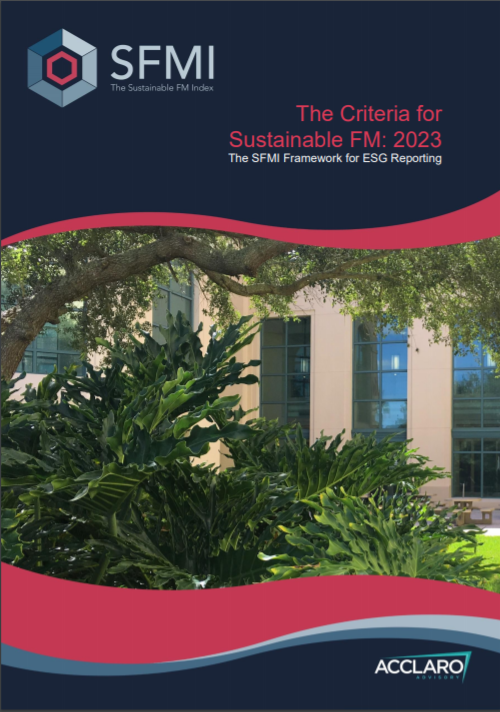The SFMI assessments for 2023 will contain more scoring around mental health and wellbeing than ever before as the emphasis on how sustainable behaviours of FM organisations become a reporting must.
The 23 Criteria Report is released ahead of the annual sustainability assessments which take place in the Autumn. We carefully monitor and review the 23 ESG criteria we use in the assessments annually. Reflecting on this past year, the report provides insight and understanding of how different elements of sustainability affect the modern FM as the industry changes to deliver more value to customers.
The 23 criteria act as a roadmap to implement a meaningful sustainable property strategy for any organisation.
Driven by learnings post-pandemic and legislative changes to the way organisations must report behaviours around sustainability, we have updated our assessment criteria to boost several areas including wellbeing, biodiversity and carbon-related initiatives.
And it’s not just about reporting: as regulations strengthen and greenwashing is being tackled, data needs to be verified and evidence demonstrating practices must be embedded within the organisation and services so best practices can be met.
Highlighting the ‘S’ in ESG
Importantly, an organisation’s impact on colleagues and the community must be demonstrated. For example, diversity is expected to be treated as a strategic issue, and internal reporting must now also include Diversity in an organisation’s supply chains to score top marks and show industry leadership. And, the importance of mental wellbeing is recognised by inclusion under Health and Safety, as well as including wellbeing in their engagement and delivery with customers and communities.
Environmental concerns broaden
While reducing carbon is getting more attention than ever, the environmental issues of biodiversity and water are being recognised as key to healthy living and sustainability. The SFMI is increasing its scoring requirements in these areas. Biodiversity will need to be included in an organisation’s net zero plans as well as their wellbeing initiatives, recognising the benefits for customers and communities.
Example: Transport
Air quality is linked with vehicle fleet and social value approach. There has been a lot of media coverage about the effect of vehicle emissions on health. Idling, driver style, and avoiding congestion areas are examples promoted to improve air quality, all of which have a social value benefit. To score highly FMs will need to demonstrate they are answering these questions:
- Are FMs measuring exhaust fume impacts on local areas?
- Are they engaging on how air pollution can be reduced? Is this being measured (in relation to social value)?
- Are EV targets linked to social value creation
Governance and Risk Management
In addition to Diversity being treated as a strategic issue, the SFMI Assessments are also strengthening the Risk Management criteria. Non-financial sustainability risks are expected to become more integrated into corporate and contract level risk registers. And best practice expects scenario testing of climate risks to be relevant to the FM business unit, as well as results being demonstrated to aid change to organisational behaviour.
Senior Sustainability Consultant, Brenda Sullivan explains the criteria changes in more detail followed by a Q&A session.
You can watch the whole webinar which includes an overview of the last 12 months for sustainability in FM and a run through of the sustainability regulatory landscape.
Webinar video: SFMI 23 ESG Criteria 2023 Update
How can we help
If you’re interested in how we can help you benchmark your current sustainability programme, and help you build a roadmap to achieve your goals, please contact us to discuss with one of our experts.





